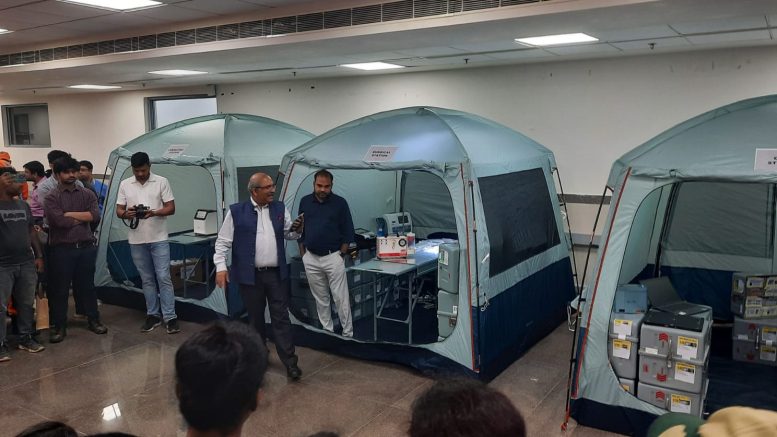Kalyani, Aug. 10: In a significant move to bolster regional disaster preparedness and emergency healthcare, AIIMS-Kalyani has been equipped with the BHISHM Cube —a revolutionary, modular medical response system. This cutting-edge, indigenous mobile hospital is designed to provide immediate, on-site trauma and surgical care for up to 200 casualties directly at disaster locations, marking a major step forward for rapid medical response in the area.
Key Features of the World’s First Portable Hospital
BHISHM, which stands for Bharat Health Initiative for Sahyog, Hita, and Maitri, is more than just a medical kit; it is the world’s first indigenous portable hospital. Developed as a comprehensive, three-pillared mobile medical unit, its primary strength lies in its speed.
- Rapid Deployment: The system can be made fully operational in just 12 minutes, a critical advantage for treating victims within the vital “golden hour” following an emergency.
- Ultimate Portability: It comprises 72 lightweight components, each weighing less than 20 kg. This modular design allows for highly versatile transport—it can be hand-carried, moved on bicycles, or even airdropped by drones into remote or inaccessible zones.
- Comprehensive Care: Once deployed, the system offers a full spectrum of advanced medical facilities, including:
- Advanced Trauma Life Support systems.
- A fully functional operation theatre (capable of performing life-saving surgery on up to 60 patients).
- Portable X-ray and ultrasound machines.
- Ventilators and refrigeration units for sensitive medicines.
- Generator-powered workstations and temporary accommodation for staff.
Technology and Innovation
Developed under the Aarogya Maitri Project by the National Security Council Secretariat (NSCS), with technical support from the Ministry of Defence, the BHISHM Cube also integrates smart technology for efficient management:
- AI Integration: It uses Artificial Intelligence and data analytics for real-time monitoring, seamless coordination, and efficient management of field operations.
- Digital Management: A tablet-based software allows operators to precisely track all equipment, monitor expiry dates, and ensure the system is ready for its next deployment.
The chief innovator and designer of the system, retired Air Vice Marshal Tanmoy Roy, who previously served as Chief Surgeon to the Indian Armed Forces, stressed the importance of swift action. “In disaster zones, time is life. BHISHM Cubes bridge the gap between rescue and treatment, ensuring last-mile medical support,” he said, emphasizing that medical personnel must accompany the system as part of the initial response team.
Ramji Singh, Executive Director of AIIMS-Kalyani, praised the initiative, calling it a “noble integration of technology and humanitarian spirit” that enables life-saving treatment within the critical golden hour.
Training and National Deployment
On Thursday, Air Vice Marshal Professor Roy conducted a live demonstration and training session at AIIMS-Kalyani for a diverse group of personnel, including doctors, nurses, disaster response teams, and officers from the Indian Army and the BSF. This hands-on training is essential to ensure the rapid and effective use of the cubes during emergencies, according to Ajay Mullick, Professor and Medical Superintendent of the institute.
The BHISHM system is already operational in high-altitude terrains with the Indian Army and Air Force. Its humanitarian role has also expanded internationally, with India recently handing over ten BHISHM cubes to the Ukrainian government, in addition to deployments in Sri Lanka and Myanmar.
The BHISHM cubes will now be stationed at AIIMS-Kalyani to significantly enhance the state’s capacity for disaster response. The institute plans to conduct weekly training programs for various stakeholders starting next week to ensure maximum preparedness for rapid and effective deployment whenever the need arises.

